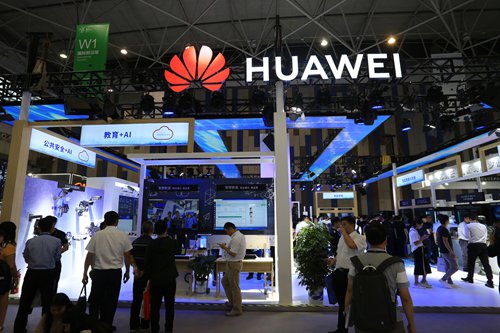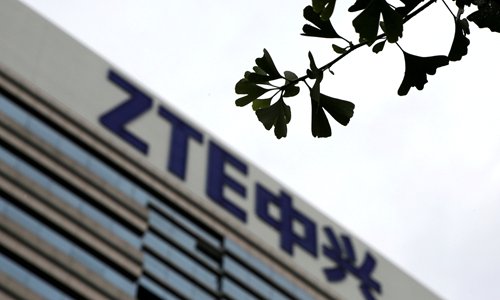
People visit the stand of Huawei during the China International Big Data Industry Expo 2019 held in Guiyang, capital of Southwest China's Guizhou Province on May 27. (Photo: IC)
China urged the US to stop its unfair and discriminatory treatment of Chinese firms following the US government moves to ban on Wednesday federal purchases of telecommunications equipment from five Chinese companies amid the protracted China-US trade war.
The latest move targeting top Chinese firms including telecommunications giant Huawei, will inflict no real impact on the companies and will only act as a bargaining chip in future trade negotiations, analysts told the Global Times Thursday.
The US Congress approved the ban as part of a broader defense bill in the National Defense Authorization Act (NDAA) in 2018.
In August 2018, US President Donald Trump signed a bill that barred the US government from using equipment from Huawei and another Chinese provider, ZTE. The ban has expanded to other Chinese firms, including surveillance camera suppliers Hikvision and Dahua, and radio systems manufacturer Hytera.
The interim rule is scheduled to take effect on Tuesday.
Chinese Foreign Ministry spokesperson Hua Chunying said on Thursday that the US' wanton use of its national power to smear and crack down on specific Chinese firms has seriously tarnished the US' image, and that the global industrial chain and supply chain will only suffer more.
"We support relevant firms to resort to legal measures to protect their interests, and China will take all necessary measures to assert Chinese firms' rights," Hua said.
Huawei said in a statement sent to the Global Times Thursday that it will continue to challenge the constitutionality of the ban in federal court.
"The news today was not unexpected as it is the continued promulgation of the rules laid out by the NDAA of 2019. The NDAA law and its implementing provisions will do nothing to ensure the protection of US telecom networks and systems, and is a trade barrier based on country-of-origin, invoking punitive action without any evidence of wrongdoing," Huawei said.
"Ultimately, it will be rural citizens across the US that will be most negatively impacted as the networks they use for digital connectivity rely on Huawei," the Chinese firm said.
A spokesman for Hikvision said it is committed to complying with laws and regulations in countries where it operates. Hikvision has made efforts to ensure that the security of its products adhere to US government standards.
ZTE and Dahua had no comment on the ban, while Hytera said it will release a statement later.
Government contractors said they were confused about the scope of the ban and what it will mean for their businesses, Reuters reported Wednesday.

A ZTE building in Beijing on June 13 (Photo: VCG)
No more new cards
"The ban has no genuine impact on Huawei since the company has largely downsized its businesses in the US," said Ma Jihua, a Beijing-based analyst in the telecommunications sector.
As early as 2014, the US had banned Huawei from bidding on US government contracts.
"The Trump administration has no more fresh cards to play in putting maximum pressure on Chinese high-tech firms," Ma said.
Ma noted that the US government's move is only meant to increase its bargaining power at future China-US trade negotiations.
The next round of high-level bilateral trade talks is scheduled to take place in the US in September.
"A slew of US moves before new negotiations have obviously shown its intentions in cracking down on China before the talks," Ma said.
Such moves have a lesser effect, Ma said.
Huawei remains on the blacklist, although US President Donald Trump promised to ease restrictions on companies selling equipment to the Chinese telecom giant at the G20 summit in June.
China urged the US government to implement its promise as soon as possible and stop using national power to crack down on Chinese firms.
In March, Huawei said it had sued the US government for "unconstitutional sales restrictions imposed by the US Congress." It filed a lawsuit in a US District Court in Plano, Texas seeking a declaratory judgment that the restrictions targeting Huawei are unconstitutional, and a permanent injunction against these restrictions.
Preparing for de-coupling
A huge domestic market, rare earths and a complete industrial chain give China more aces when sticking to its development path amid external chaos, analysts said.
Technology decoupling between China and the US will bring much harm to both countries, but China has been preparing to survive either through self-reliance or by expanding cooperation with other countries, they said.
"Regardless of what the US will do to China or Chinese tech firms next, it will not fall out of expectations," said Sun Chenghao, an assistant research fellow at the Institute of American Studies of the China Institutes of Contemporary International Relations.
"In fact, we have been beefing up efforts to tackle the trade war, especially the Cold War in advanced manufacturing and high technologies for a long period of time," Sun told the Global Times Thursday.
Since announcing its plan-B of HiSilicon in May, Huawei has become more confident, industry insiders noted.
HiSilicon can provide enough supplies to major Huawei products such as smartphones, and its Balong 5000 chipset has also passed network tests and can now operate in both standalone and non-standalone 5G-network environments.
Huawei has been diversifying its supply chain in recent months while continuously investing in core technologies such as chipsets and an operating system. And the company has been preparing for the worst-case scenario for some years and is capable of designing and producing chipsets such as the Balong 5000.
It is expected to unveil the HongMeng OS on Friday in its production base in Dongguan, South China's Guangdong Province, and the first batch of devices with the HongMeng OS will be the Honor smart TV series, which will be introduced in the market on August 10, media reported.
Some of its senior executives have also reiterated their confidence in Huawei's business, particularly when facing growing pressure from the US.
"Huawei still needs to work with its US counterparts for the supply of some components, but it has been working very hard in strengthening self-reliance in core chipsets and components for long-term growth," Xiang Ligang, director-general of the Beijing-based Information Consumption Alliance, told the Global Times Thursday.
China still has advantages in the full-scale supply chain on which the US companies rely on, and the decoupling of the industries is unlikely in the near future, he said.
However, the US crackdown on Huawei has helped form a consensus in the country's high-tech sector, as more companies increase investment in research and development to boost competitiveness.


